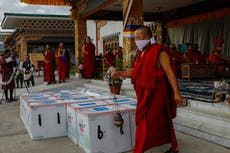Bhutan to ban import of almost all vehicles to stave off Sri Lanka-like crisis
Country’s foreign exchange reserves hit hard by Covid pandemic
Bhutan has decided to ban the import of all vehicles, except utility vehicles, heavy earth-moving machines and agriculture machinery to save dwindling foreign exchange reserves hit hard by the pandemic and the ongoing Russian war in Ukraine.
The move comes as fellow south Asian country Sri Lanka continues to battle a crushing economic crisis.
In a notification that came into effect on 18 August, the Bhutan government’s finance ministry said the import of utility vehicles costing less than 1.5 million Bhutanese ngultrums ($18,750 or £15,885) would be allowed and those for the use and promotion of tourism would be exempted.
“The moratorium is implemented to ensure adequate foreign currency reserves for maintaining macroeconomic stability,” it said.
According to data released by the Royal Monetary Authority of Bhutan last month, the country’s foreign exchange reserves had declined to $970m at the end of December from $1.46bn in April 2021.
The country’s foreign exchange reserves had been hit hard by the pandemic which has seen a strict zero-Covid policy that has barred foreign tourists for the past two years.
On Sunday, finance minister Namgay Tshering said to local newspaper Kuensel that the government will review the moratorium on the import of vehicles after six months.
While the moratorium was imposed in view of a drastic depletion of currency reserves and a worsening Balance of Payments – or the difference between the inflow and outflow of money – the finance minister said reserves would be reviewed on a monthly basis.
He added that the moratorium would be eased gradually depending on how the situation improves.
The government has also prepared a detailed plan of action and a list of goods whose imports would be restricted if the situation worsens.
Importers in Bhutan said the government’s decision will hit them hard if the moratorium is extended.
Kumar Subba, the general manager of Singkhar Private Ltd which is the exclusive distributor for Kia motors in the country, told Business Bhutan that if the ban is prolonged, the company will face difficulties to sustain and may have to lay off employees.
“We would not be in a position to pay salary to staff, besides paying loans and rent,” said Pema Lodey, the senior general manager of Bhutan Hyundai.
Join our commenting forum
Join thought-provoking conversations, follow other Independent readers and see their replies
Comments




Bookmark popover
Removed from bookmarks